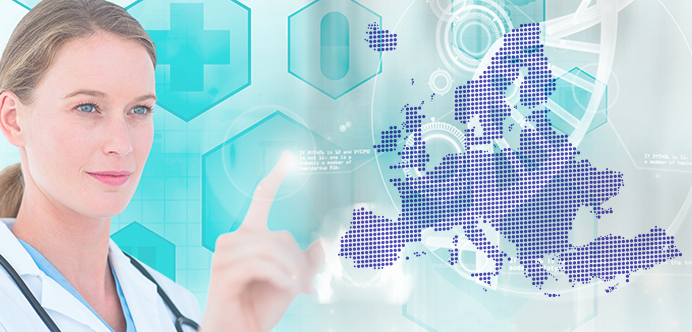
Next May 25, the new General Data Protection Regulation for European citizens will come into force. For the first time, Brussels sets common standards on the right of people to know who, how, and why their data are being used or stored. In this framework, the European Commission wants to strengthen the coordination between states in the exchange of health data and demands the digital transformation of health systems.
Madrid, May 17, 2018. Secure and cross-border access to electronic health records, European infrastructure to support personalized medicine, and digital tools that empower citizens are the three axes that underpin the action of the European Union in terms of digital health. At the end of last April, and with an eye on the new data protection regulations of the old continent, the European Commission laid the foundations of health in the digital society. In short, the health care of the future will be defined by innovation based on health data.
Vytenis Andriukaitis, the Health and Food Safety Commissioner, said on April 25: "Our proposals take advantage of the full potential of digital technologies to improve health care and medical research." He also added: "This will lead to easier access to health data and will bring better disease prevention and patient-centered care, as well as rapid responses to pandemic threats and improved treatments.” In this line, the European Commission proposed a series of measures to increase the availability of health data in the European Union.
The objective pivots on the formula of joint work and shared experience. Efforts are currently focused on voluntary cooperation between the member states for the exchange of electronic prescriptions and medical records and collaboration on genomic data for research and personalized attention. Thus, with the support of the Connecting Europe Facility program, it is expected that the first interoperable registries will be carried out in eight member states by the end of this year, and that other nations will be incorporated by 2020. The adoption of a standard exchange format for this information will result in a common framework in the context of the Digital Single Market.
The Commission gives priority to citizens regarding their health data: ensuring citizens' access to them and introducing the possibility of sharing them across borders; using large data sets that lead to optimal medical diagnoses and solutions, as well as to better anticipate epidemics; and encouraging the use of programming interfaces that allow public authorities to make better use of health data for the purposes of research and reform of health systems. The active commitment of all parties is essential to achieve the benefit of citizenship, health systems, and the European market.
Data science
The communication by the Commission mentions the willingness to share scientific data in 2018 and offers guidance on the application of open access policies, the creation of a European open science cloud, and the mining of texts and data. It also underlines the importance of providing incentives, rewards, capabilities, and adequate parameters for the new era of network research. The Commission will promote the grouping of data on European resources and facilitate its use for research and health policy work, while also extending its support for the evaluation of health technologies.
In the short term, the challenge is to provide access to at least one million genomes sequenced in the EU by 2022 and to 10 million by 2025. In addition, the Commission has approved three cross-border data exchange pilot projects: one to improve the treatment, diagnosis, and prevention of rare diseases; another to anticipate epidemics and identify infectious cross-border threats; and one more for the use of Real World Data by professionals, health authorities, and the industry. After these projects, others will surely come in the fields of neurodegenerative diseases and cancer.
ICT in the health sector
According to the vice-president of the Commission responsible for the Digital Single Market, Andrus Ansip: “Without data, we will not make the most of artificial intelligence, high-performance computing, and other technological advances." And how does this digital transformation translate into the health sector? No doubt, in the collection and obtaining of new data thanks to the Internet of Things and Big Data. But the list is longer: telecare, standardized use of health applications, automatized medical processes in hospitals, 3D printing of organs, operating robots, and medical training through simulation. On the one hand, patients assume a more active role in relation to their own health care and, on the other hand, professionals are given more and better resources to test their competence and face clinical practice.
Our personalized help center enables you to obtain technical support and help for navigating through the site and using the program.